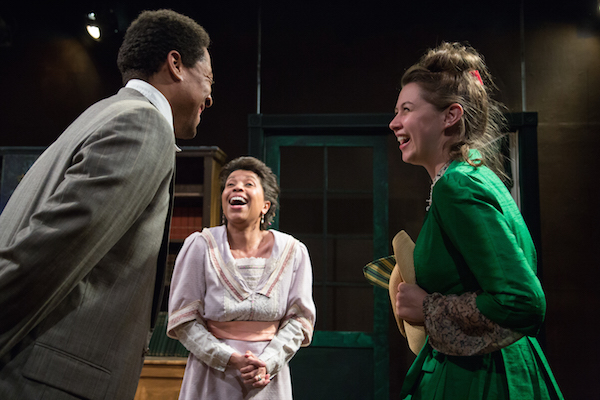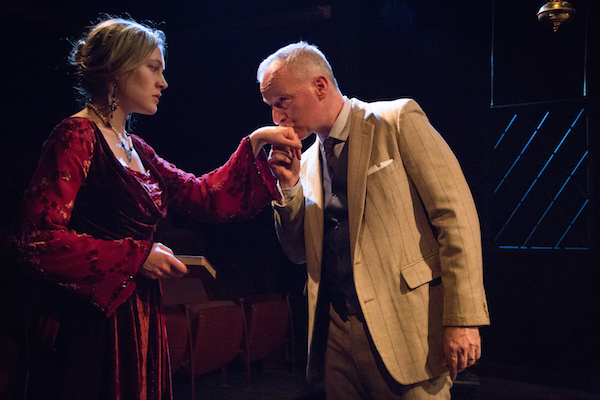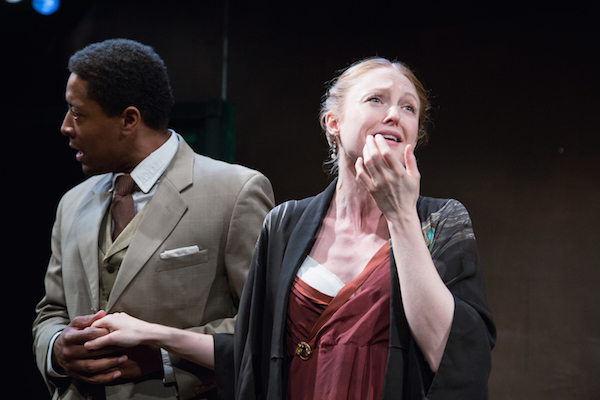
BY TRAV S.D. | For almost two decades, the Lower East Side’s Metropolitan Playhouse has been performing the valuable public service of presenting long-lost plays from America’s past, mostly from the early 20th century or before — the era when melodrama was king, a style and aesthetic that fell out of public favor as the century progressed.
A key figure in the public’s conversion to a greater preference for realism was Eugene O’Neill. An ironic consequence of that shift in consciousness is that O’Neill’s own works have come to be regarded as outdated, especially his early ones. The Metropolitan strives to breathe new life into them. Nine years ago, they presented a festival of five early O’Neill one-acts — and through June 26, they’ll be doing the same with “O’Neill (Unexpected),” a double bill consisting of the plays “Recklessness” (1913), and “Now I Ask You” (1916).
“Recklessness” is a delicious melodrama, a one-act clearly derived from Strindberg’s “Miss Julie,” in which the bored wife (Erin Beirnard) of a rich man (Kelly King) is having an affair with the chauffeur (Jeremy Russial). The husband discovers the truth, resulting in a domino effect of tragic consequences. (If you know O’Neill it should be very easy to imagine the climax, although the playwright does give us a nifty fake-out).
“Now I Ask You” is more of a satire and a comedy of manners, rare territory for O’Neill — but fans of the playwright will recognize something of the ironic tone he would employ in “Ah, Wilderness!” a couple of decades later. Here he pokes fun at Greenwich Village bohemians. A young middle class couple (Emily Bennett and Terrell Wheeler) tie the knot — but instead of going through with a conventional marriage, they sign a Free Love Agreement. Wanting to teach them a lesson, the girl’s mother (Kim Yancey-Moore) eggs the pair on in flirtations with their radical friends (Dylan Brown and Eric R. Williams). How’s that likely to work out? Hint and reminder: This is O’Neill, and the line between farce and tragedy can often be thin.

Neither of these early, experimental plays was ever produced during O’Neill’s lifetime, and productions remain rare to this day. What’s “unexpected” about this pair of works is the surprisingly light touch the famously heavy-handed playwright brings to the table. And, while we often associate O’Neill with “low” naturalistic settings (ships, barrooms, farms and the like), these two works — like many of his very earliest plays — were more conventional for their time in taking place in the drawing rooms of the well-to-do.
“There are two things I like about working on early O’Neill,” says Metropolitan’s Artistic Director (and “Unexpected” director) Alex Roe. “One is the exciting fact that many of these plays are almost prototypes of the later, better-known plays, their characters and plot points. The other [thing] is, that when you present these plays on stage, they still come alive. They remain potent and meaningful.”
And that’s a point worth making. Historically, O’Neill stands at the juncture of two different eras. Especially in his early plays, he has one foot (at least) firmly planted in old school melodrama. Yet O’Neill had so much more going for him than the hack contemporaries George Bernard Shaw called Sardoudlists (after the much emulated but highly repetitive French playwright Victorien Sardou).
“When people are critical of melodrama,” says Roe, “it’s generally because it’s overly reliant on certain stock devices and its effects are unearned. But O’Neill is much subtler than that. He’s really got an uncanny ability to tease out complicated dramatic motivations and conflicts from his characters drawn from their psychologies and relationships. It’s as though he’s taken the old melodramatic climaxes, like an exploding steamship or a woman being tied to the railroad tracks, and replaced it with something more recognizable but equally devastating — like a breaking heart.”
O’Neill’s naturalistic gifts allow Roe to direct as though he were putting on a contemporary American play, in a way that serves the expectations of both modern actors and audiences. And that’s important, because these plays are still relevant.

“These plays capture a moment when America was in radical transition,” says Roe. “After World War One people started asking ‘What are the conventional norms and values that got us into this boat?’ They started looking for new explanations. Bohemians disrupting the social order, women seeking the vote, advocates for child welfare, and other social changes. And now we’re distanced enough that we can recognize ourselves going through a similar moment. It still resonates. These problems weren’t unique to O’Neill’s time. This isn’t just archaeology.”
PERFORMANCES ADDED: Wed., June 29 & Thurs., June 30, 7:30pm.
“O’Neill (Unexpected)” is presented June 10–June 26: Thurs.–Sat. at 7:30pm; Sat. & Sun. at 3pm. Additional performances Wed., June 15 & 22 at 3pm. At Metropolitan Playhouse (220 E. Fourth St., btw. Aves. A & B). For tickets ($25, $20 for students & seniors, $10 for ages 18 & under), call 800-838-3006 or visit metropolitanplayhouse.org.




































